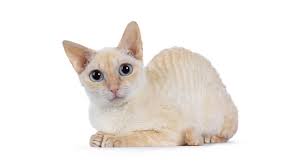
German Rex
Conditions of detention
German Rex cats are adaptable and thrive in a variety of living environments, including apartments and larger homes. They enjoy interactive play and require a stimulating environment where they can climb, explore, and engage with their human companions.
Useful Fact:
German Rex cats are social and enjoy being involved in family activities. They often seek out attention and interaction, making them excellent companions for active households.
Nutrition and diet
German Rex cats require a balanced diet rich in high-quality proteins and essential nutrients to support their health and maintain their unique coat. Both wet and dry cat food are suitable, but it is important to ensure they receive all necessary vitamins and minerals.
Useful Fact: Including omega-3 and omega-6 fatty acids in their diet can help maintain the health and shine of their curly coat.
Health
German Rex cats are generally healthy with no specific genetic disorders. However, regular veterinary check-ups are important to monitor their overall health and catch any potential issues early.
Useful Fact: Their low-shedding, curly coat makes them a good choice for people with mild allergies.
Grooming and care
The German Rex’s curly coat requires minimal grooming. Weekly brushing is usually sufficient to keep their coat in good condition and reduce shedding. Regular dental care, ear cleaning, and nail trimming are also important.
Useful Fact: The unique texture of their coat means they rarely mat, but they can benefit from occasional baths to keep their skin and coat clean.
Education and training
German Rex cats are intelligent and can be trained with positive reinforcement techniques. They can learn basic commands, use a litter box effectively, and enjoy interactive play.
Useful Fact: Starting training early helps in developing good behavior patterns and makes the cat more adaptable to various situations.
Toys and entertainment
German Rex cats are playful and enjoy a variety of toys, including interactive toys, balls, and feather wands. Providing different types of toys helps to keep them mentally and physically stimulated.
Useful Fact: Regular play sessions can help maintain their weight and overall health, preventing boredom and related behavioral issues.
Safety
Ensure your home is cat-proofed by securing windows and balconies and keeping hazardous substances out of reach. Microchipping and providing ID tags are recommended for identification.
Useful Fact: Creating a safe indoor environment with plenty of enrichment can prevent the need for outdoor exploration, reducing the risk of accidents or injuries.
Accessories
Essential accessories for a German Rex include a sturdy scratching post, a comfortable bed, and various grooming tools. A cat carrier is also important for trips to the vet or travel.
Useful Fact: Investing in high-quality scratching posts and beds can significantly enhance your cat’s comfort and well-being.
Socialization
German Rex cats are sociable and generally get along well with other pets and people. Early socialization helps them become well-adjusted and friendly.
Useful Fact: Introducing them to different environments and experiences at a young age can prevent fearfulness and promote confidence.
Travel and Transportation
When traveling with a German Rex, use a secure and comfortable cat carrier. Familiarize them with the carrier beforehand to reduce stress. Regular breaks and hydration are important during long journeys.
Useful Fact: Short practice trips can help your German Rex get used to traveling, making longer journeys less stressful.
Behavior and psychology
German Rex cats are known for their playful, curious, and affectionate nature. Understanding their need for mental and physical stimulation can help in managing their behavior and keeping them happy.
Useful Fact: Providing interactive toys and engaging activities can help prevent behavioral issues such as scratching or excessive meowing.
Legal aspects
Check local regulations regarding pet ownership, as there may be specific requirements for keeping cats, including licensing and vaccination. Ensure you comply with all legal aspects to avoid complications.
Useful Fact: Keeping your cat’s medical records and identification up-to-date can be helpful in legal matters and in case of emergencies.


